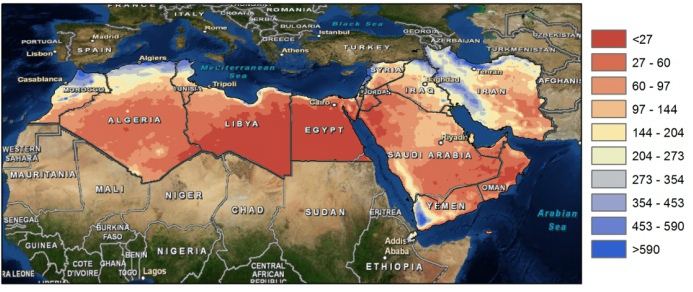The Middle East and North Africa (MENA) region is considered the most water-scarce region of the world. Water investments absorb large amounts of public funds, which could often be used more efficiently elsewhere. The need for alternative and improved water management options is therefore urgently needed, but a clear overview on what the main focus should be is lacking. To explore different options the World Bank initiated an initiative to generate an improved understanding of water issues in the region and overview of available options under different scenarios of water supply and demand management with special focus on desalination, taking into account the energy nexus and environmental concerns. As part of this initiative, FutureWater carried out an assessment of water stress in the MENA region, including associated marginal cost of water supply to meet the water supply need.
The Middle East and North Africa (MENA) region is considered the most water-scarce region of the world. Disputes over water lead to tension within communities, and unreliable water services are prompting people to migrate in search of better opportunities. Water investments absorb large amounts of public funds, which could often be used more efficiently elsewhere. As the region’s population continues to grow, per capita water availability is set to fall by 50 percent by 2050, and, if climate change affects weather and precipitation patterns as predicted, the MENA region may see more frequent and severe droughts and floods

The need for alternative and improved water management options is therefore urgently needed, but a clear overview on what the main focus should be is lacking. A broad range of options exists which can be grouped by different approaches such as reducing the demand, increasing the supply, transfer between different sectors, transfer within different sectors, increase storage etc. An important aspect for the MENA region includes desalination.

To explore different options the World Bank initiated an initiative to generate an improved understanding of water issues in the region and overview of available options under different scenarios of water supply and demand management with special focus on desalination, taking into account the energy nexus and environmental concerns. As part of this initiative, FutureWater will carry out an assessment of water stress in the MENA region, including associated marginal cost of water supply to meet the water supply need. Conducting consultation workshops and meetings will be organized with relevant parties in the region (governmental, universities, civil society groups).
Related publications
2013 - International Journal of Climatology
Climate change projections of precipitation and reference evapotranspiration for the Middle East and Northern Africa until 2050
Terink, W., W.W. Immerzeel, P. Droogers
2013 - Journal of Hydrology
Economic concepts to address future water supply–demand imbalances in Iran, Morocco and Saudi Arabia
Hellegers, P., W.W. Immerzeel, P. Droogers
2012 - Hydrology and Earth System Sciences
Water resources trends in Middle East and North Africa towards 2050
Droogers, P., W.W. Immerzeel, W. Terink, J. Hoogeveen, M.F.P. Bierkens, L.P.H. Van Beek, B. Debele
2011 - FutureWater Report 98
Middle-East and Northern Africa Water Outlook
Immerzeel, W.W., P. Droogers, W. Terink, J. Hoogeveen, P. Hellegers, M. Bierkens, R. Van Beek

